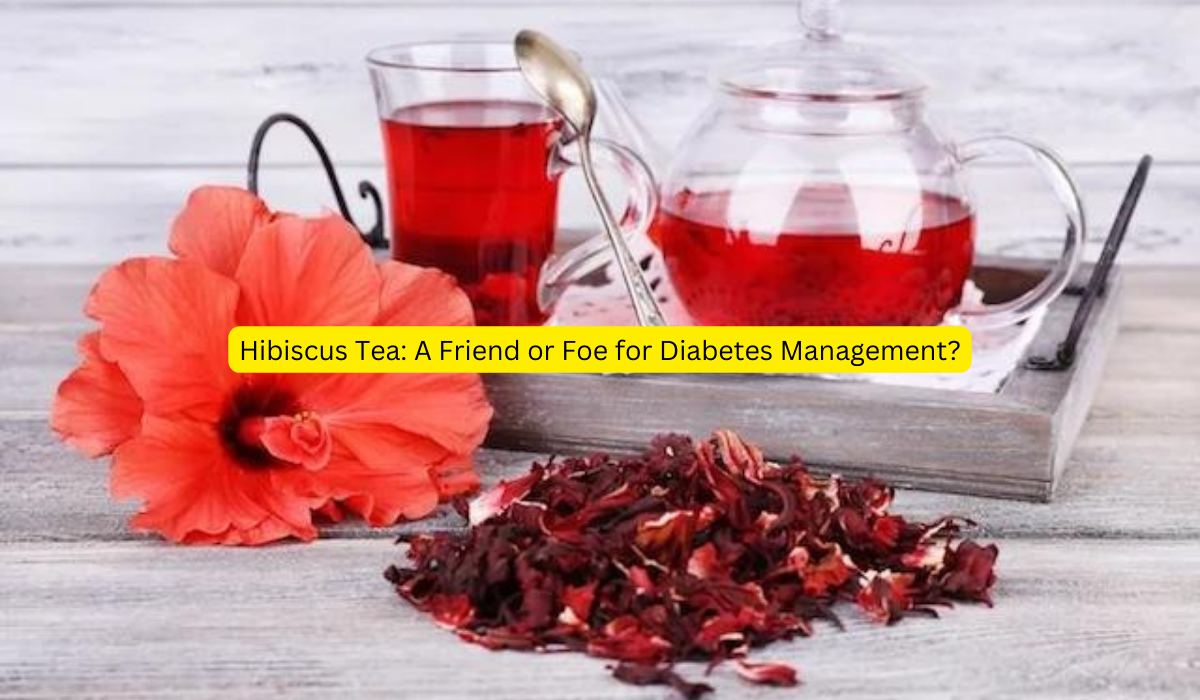Hibiscus tea, a vibrant crimson beverage brewed from the dried flowers of the Hibiscus sabdariffa plant, has gained popularity for its potential health benefits. Imagine a steaming cup of this ruby-red liquid, boasting a tart and tangy flavor. But can this trendy tea truly live up to the hype, particularly when it comes to managing diabetes? Let’s delve into the world of hibiscus tea and explore its potential impact on blood sugar levels.
The Science Behind Hibiscus: Unveiling Potential Benefits
Studies suggest that hibiscus tea might offer some advantages for people with diabetes, but it’s important to remember that it’s not a magical cure-all. Here’s a breakdown of the science:
- Potential Blood Sugar Control: Some research indicates that hibiscus tea consumption may lead to a modest decrease in blood sugar levels. Think of it as a gentle nudge in the right direction, potentially helping to keep your blood sugar within a healthy range.
- Blood Pressure Benefits: Hibiscus tea might also have a positive effect on blood pressure, another concern for people with diabetes. Imagine this as a double whammy, potentially aiding in managing both blood sugar and blood pressure.
- Antioxidant Powerhouse: Hibiscus tea is rich in antioxidants, which can help combat free radicals that damage cells and contribute to various health issues. Think of antioxidants as tiny warriors fighting off harmful molecules in your body.
Important Note: These potential benefits are based on research findings, but more studies are needed to confirm a definitive cause-and-effect relationship between hibiscus tea and diabetes management.
Facts to Consider Before You Brew: Potential Drawbacks
While hibiscus tea might offer some promising benefits, there are also some factors to keep in mind:
- Limited Research: The existing research on hibiscus tea and diabetes is still in its early stages. Think of it as a developing story, with more chapters needed to understand the full picture.
- Dosage and Consistency: Studies suggesting potential benefits typically involve consistent consumption of hibiscus tea for several weeks. Imagine needing to make hibiscus tea a regular part of your routine to see potential effects.
- Drug Interactions: Hibiscus tea might interact with certain medications, particularly blood pressure medications. Think of it as a potential conflict, so it’s crucial to consult your doctor before incorporating hibiscus tea into your routine if you’re on medication.
- Individual Variability: Just like any other food or beverage, hibiscus tea might not affect everyone the same way. Think of your body as unique, and its response to hibiscus tea could be different from someone else’s.
Striking the Right Balance: Integrating Hibiscus Tea into Your Diabetic Diet
If you’re interested in including hibiscus tea in your diabetes management plan, here are some key points:
- Consult Your Doctor: Always talk to your doctor before introducing any new supplements or herbal remedies, including hibiscus tea.
- Monitor Your Blood Sugar: If you decide to try hibiscus tea, keep a close eye on your blood sugar levels and communicate any changes to your doctor.
- Maintain a Healthy Lifestyle: Hibiscus tea, if proven effective for you, should be seen as a complementary strategy, not a replacement for a healthy diet, exercise, and proper medication adherence. Think of it as a potential tool in your diabetes management toolbox, but not the only one.
Remember: Hibiscus tea is not a substitute for professional medical advice or treatment for diabetes.
Conclusion
Hibiscus tea may offer a glimmer of hope for people with diabetes, with some studies suggesting potential benefits for blood sugar control and blood pressure. However, the research is ongoing, and it’s crucial to maintain a healthy lifestyle through diet, exercise, and medication as prescribed by your doctor. If you’re curious about incorporating hibiscus tea into your diabetes management plan, talk to your doctor first and ensure you understand the potential benefits and drawbacks.
Frequently Asked Questions
1. Are there any side effects associated with drinking hibiscus tea?
While generally considered safe for most people in moderate amounts, hibiscus tea can potentially cause some side effects. These might include stomach upset, headache, or dizziness. If you experience any discomfort after consuming hibiscus tea, discontinue use and consult your doctor.
2. Can I sweeten my hibiscus tea with sugar if I have diabetes?
It’s best to avoid adding sugar to your hibiscus tea if you have diabetes. Consider using natural sugar substitutes like stevia or monk fruit extract to add a touch of sweetness without spiking your blood sugar levels.
3. Does hibiscus tea have any other potential health benefits beyond diabetes management?
Studies suggest that hibiscus tea might offer other potential health benefits, such as lowering cholesterol levels, aiding weight management, and promoting liver health. However, more research is needed to confirm these potential benefits conclusively.
4. Can I drink hibiscus tea cold or hot?
Hibiscus tea can be enjoyed hot or cold. For a refreshing summer beverage, brew your tea hot and then chill it in the refrigerator. In colder months, enjoy it hot for a comforting and potentially blood sugar-supporting drink.
5. Where can I find hibiscus tea?
Hibiscus tea can be readily found in most health food stores, online retailers, and some grocery stores. It’s typically available loose-leaf, in tea bags, or even as pre-bottled beverages.

